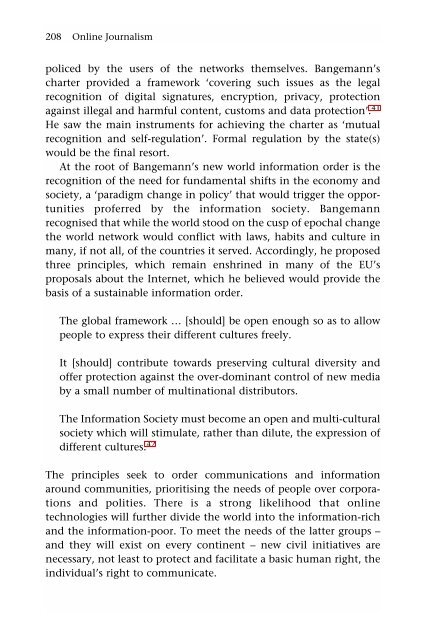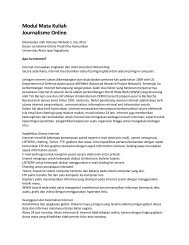Online Journalism - Ayo Menulis FISIP UAJY
Online Journalism - Ayo Menulis FISIP UAJY
Online Journalism - Ayo Menulis FISIP UAJY
Create successful ePaper yourself
Turn your PDF publications into a flip-book with our unique Google optimized e-Paper software.
208 <strong>Online</strong> <strong>Journalism</strong><br />
policed by the users of the networks themselves. Bangemann’s<br />
charter provided a framework ‘covering such issues as the legal<br />
recognition of digital signatures, encryption, privacy, protection<br />
against illegal and harmful content, customs and data protection’. 41<br />
He saw the main instruments for achieving the charter as ‘mutual<br />
recognition and self-regulation’. Formal regulation by the state(s)<br />
would be the final resort.<br />
At the root of Bangemann’s new world information order is the<br />
recognition of the need for fundamental shifts in the economy and<br />
society, a ‘paradigm change in policy’ that would trigger the opportunities<br />
proferred by the information society. Bangemann<br />
recognised that while the world stood on the cusp of epochal change<br />
the world network would conflict with laws, habits and culture in<br />
many, if not all, of the countries it served. Accordingly, he proposed<br />
three principles, which remain enshrined in many of the EU’s<br />
proposals about the Internet, which he believed would provide the<br />
basis of a sustainable information order.<br />
The global framework … [should] be open enough so as to allow<br />
people to express their different cultures freely.<br />
It [should] contribute towards preserving cultural diversity and<br />
offer protection against the over-dominant control of new media<br />
by a small number of multinational distributors.<br />
The Information Society must become an open and multi-cultural<br />
society which will stimulate, rather than dilute, the expression of<br />
different cultures. 42<br />
The principles seek to order communications and information<br />
around communities, prioritising the needs of people over corporations<br />
and polities. There is a strong likelihood that online<br />
technologies will further divide the world into the information-rich<br />
and the information-poor. To meet the needs of the latter groups –<br />
and they will exist on every continent – new civil initiatives are<br />
necessary, not least to protect and facilitate a basic human right, the<br />
individual’s right to communicate.
















